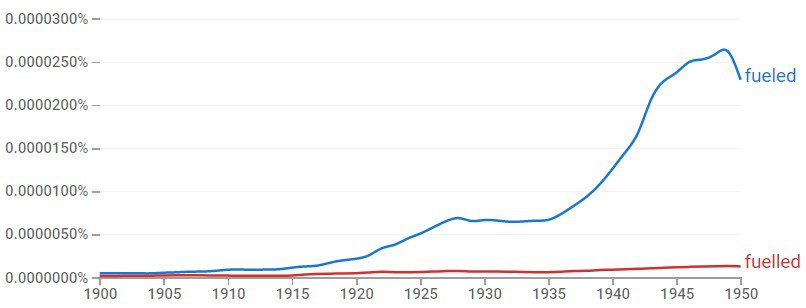Fueled/fueling vs. fuelled/fuelling
In American English, the verb fuel is inflected fueled and fueling—with one l. In all other main varieties of English, it becomes fuelled and fuelling—with two l‘s. The spelling difference extends to refuel, which makes refueled and refueling in American English and refuelled and refuelling everywhere else. It likewise extends to other, rarer derivatives such as fueler/fueller.
Fuel is one of a large group of l-ending verbs whose inflected forms have lost the second l in American English. This change has happened in at least two waves, with some of the verbs losing the extra l in the early decades of the 20th century (e.g., travel, label), and many others dropping the l only over the last few decades (e.g., cancel, marshal). The story with fuel is a little different, because it was rare as a verb until the 20th century (it did exist as a verb earlier, but was rare and mostly figurative until 20th-century technology increased its usefulness). The ngram below, which graphs the use of fueled and fuelled in a large number of U.S. texts published from 1900 to 1950, suggests the two forms vied briefly for ascendancy before fueled became the prevalent form in the 1920s:

Outside the U.S., meanwhile, the American forms have not caught on much; the two-l forms still prevail by a large margin in the U.K., Ireland, Australia, South Africa, and New Zealand, while in 2013 Canadian news articles the U.S. forms appear about a quarter of the time.
Examples
U.S.
Meanwhile, word of a new round of economic change has created uncertainty among North Koreans, already fueling inflation. [New York Times]
Tehran is asking France’s Total SA to resume refueling its passenger aircraft. [Wall Street Journal]
In 2008, fueled by excitement over the presidential candidacy of then-Sen. Barack Obama, Will.i.am’s video “Yes We Can” became a viral hit. [LA Times]
Outside the U.S.
One of Britain’s most common cancers could be fuelled by the E coli stomach bug, scientists believe. [Daily Mail (U.K.)]
A team of six personnel including doctors left Melbourne earlier today aboard an Australian government aircraft that refuelled in Hobart. [Sydney Morning Herald]
Keyera’s Mr. Smith says oil sands production growth is also fuelling a demand for storage space for condensate. [Globe and Mail (Canada)]
Iran accuses its foes in the West and the Arab world of fuelling the conflict by backing the opposition. [Irish Times]






